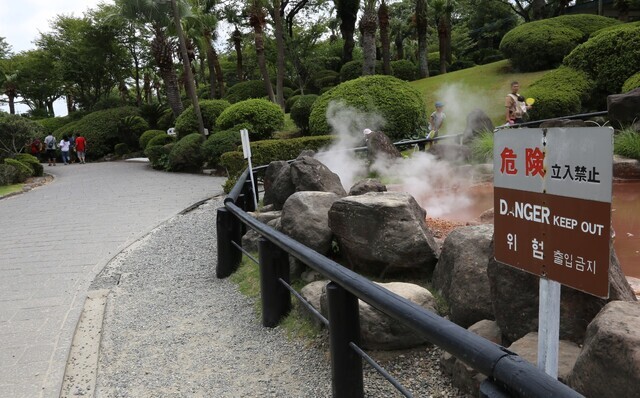hankyoreh
Links to other country sites 다른 나라 사이트 링크
Heat shock kills 3 Koreans during recent visits to Japan’s hot springs

What should have been a fun package trip to Hokkaido, Japan, for Lee Jeong-hwan, 51, and his family ended in tragedy.
Lee’s father, 76, died after experiencing a sudden rise in blood pressure while enjoying a hot spring bath at their hotel during the Lunar New Year holiday. After finishing his bath, Lee was waiting for his father outside when he heard a commotion coming from inside the hot spring. Dreading the worst, he rushed back into the hot spring only to find his father receiving CPR from another bather.
The aid that followed was not adequate. Most of the aging hotel employees were too flustered to provide assistance, and the automated external defibrillator meant for such emergencies was broken. The family’s local guide arrived 30 minutes after Lee’s father collapsed, and an ambulance came 40 minutes after being called. Heavy snow did not help the drive to the hospital, and Lee’s father arrived at the hospital an hour and 50 minutes after he was found. He was pronounced dead upon arrival.
The local police released the results of their post-mortem examination in which they stated that myocardial infarction was the cause of death. The process of repatriating the body to Korea proved difficult, forcing the Lee family to complete the funeral rites and cremation in Japan.
With many traveling to Japan after it reopened visa-free entry for numerous countries including Korea, it has been confirmed that three Koreans have died of heat shock in hot springs in the last two months. As rapid temperature change can be fatal for the elderly, travel agencies and tourists who plan on using hot springs during the winter are urged to be wary of this fact.
According to the Hankyoreh’s coverage on Sunday, three nationals have died in Japanese hot springs since visa-free travel to Japan was made available to the Korean public in October 2022.
One person died in Beppu, Kyushu, in December 2022, while in January, two Koreans died, one in Beppu and one in Sapporo, Hokkaido. All were elderly and died due to sharp spikes in blood pressure known as the “heat shock reaction” which can occur when moving from a cold environment to a warm environment and can lead to stroke or heart attack.
In Japan, where bathing culture, which includes hot springs, is popular, heat shock deaths typically occur between November and February. In December 2022, Shinya Hayasaka, a professor of human sciences at Tokyo City University, analyzed that the death toll from heat shock will exceed 20,000 in 2022 while appearing on newscaster NHK.
This includes deaths at home, which are thought to be caused due to Japan’s poor housing insulation. With many Korean tourists visiting Japan, travelers are advised to take precautions to avoid heat shock. According to statistics from the Japan National Tourism Organization, 894,459 Koreans visited Japan between October and December in 2022, when Japan reopened visa-free travel. That means that Koreans made up 32% of the total number of inbound travelers (around 2.8 million) to Japan, which makes it the country sending most tourists to Japan.
However, the travel agency that Lee used, not to mention most large travel agencies in Korea, fail to mention the risk of heat shock even in the fine print of their Japanese hot spring trip information.
Most only posted overseas safety information provided by the Ministry of Foreign Affairs about earthquakes and traffic accidents.
“My father didn’t smoke or drink and didn’t have any underlying diseases,” said Lee. “We never thought that something like this would happen at a hot spring. We were not informed of such a danger by our local tour guide.”
By Lee Woo-yun, staff reporter
Please direct questions or comments to [english@hani.co.kr]

Editorial・opinion
![[Guest essay] Preventing Korean Peninsula from becoming front line of new cold war [Guest essay] Preventing Korean Peninsula from becoming front line of new cold war](https://flexible.img.hani.co.kr/flexible/normal/500/300/imgdb/original/2024/0507/7217150679227807.jpg) [Guest essay] Preventing Korean Peninsula from becoming front line of new cold war
[Guest essay] Preventing Korean Peninsula from becoming front line of new cold war![[Column] The state is back — but is it in business? [Column] The state is back — but is it in business?](https://flexible.img.hani.co.kr/flexible/normal/500/300/imgdb/original/2024/0506/8217149564092725.jpg) [Column] The state is back — but is it in business?
[Column] The state is back — but is it in business?- [Column] Life on our Trisolaris
- [Editorial] Penalties for airing allegations against Korea’s first lady endanger free press
- [Editorial] Yoon must halt procurement of SM-3 interceptor missiles
- [Guest essay] Maybe Korea’s rapid population decline is an opportunity, not a crisis
- [Column] Can Yoon steer diplomacy with Russia, China back on track?
- [Column] Season 2 of special prosecutor probe may be coming to Korea soon
- [Column] Park Geun-hye déjà vu in Yoon Suk-yeol
- [Editorial] New weight of N. Korea’s nuclear threats makes dialogue all the more urgent
Most viewed articles
- 1Behind-the-times gender change regulations leave trans Koreans in the lurch
- 2Family that exposed military cover-up of loved one’s death reflect on Marine’s death
- 3Japan says its directives were aimed at increasing Line’s security, not pushing Naver buyout
- 4Yoon’s revival of civil affairs senior secretary criticized as shield against judicial scrutiny
- 5Marines who survived flood that killed colleague urge president to OK special counsel probe
- 6Unexpected rate of AI development requires timely discussion of side effects
- 7[Guest essay] Preventing Korean Peninsula from becoming front line of new cold war
- 8[Guest essay] Maybe Korea’s rapid population decline is an opportunity, not a crisis
- 9A breath of fresh air: Innovative architecture in the time of COVID-19
- 10S. Korean first lady likely to face questioning by prosecutors over Dior handbag scandal